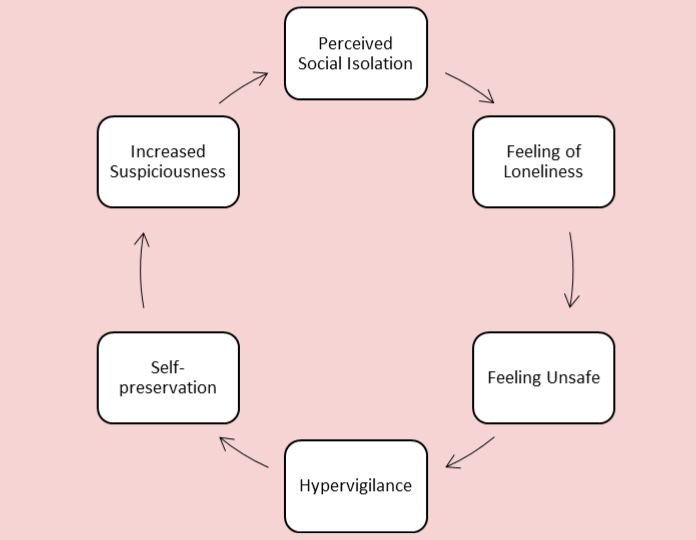“Modern loneliness, we’re never alone / But always depressed, yeah / Love my friends to death / But I never call and I never text, yeah”.
These are not just the lyrics from a famous pop-song, but a sentiment shared by millions of people worldwide. In a world connected more than ever before, people report feeling lonelier than ever before. Social fabric has been fraying, effective network sizes shrinking and meaningful relationships diminishing be it on a personal, familial or a communal level.
The pandemic lockdown increased the burden of loneliness, which had already been showing signs of being an epidemic in itself across many countries including Australia, the USA, and the UK. According to studies conducted before the lockdown, as of 2018, as many as 40% of adults over 65 years of age and 80% of those under the age of 18 years worldwide reported feeling lonely at least once in the last 6 months and loneliness being a chronic state for about 15-30% of the general population. With the quarantine, self-isolations and lockdowns imposed across the globe due to Covid-19, the grievances of loneliness have debilitated manifold and the topic has become more relevant today than ever before.
On an individual level, loneliness has been shown to interfere with physiological functioning to increase one’s susceptibility to heart attacks, strokes, and cancers, and decrease immunity; alter psychological processes making one more vulnerable to depression and anxiety; diminish sleep quality and increase one’s morbidity and mortality. Considering the people most vulnerable to the affliction, which includes young children, adolescents, young mothers, divorced people and the elderly, it is apparent why loneliness is not just a personal plight but a matter of social and national concern.
Evolutionarily, human survival has been so dependent on socially affiliative behaviours that even in the contemporary individualistic society these behaviours inhabit a prominent place. We have such a strong need for social affiliation and robust bonds that we perceive social isolation when social opportunities and relationships exist, but we lack the tools to harness the power of that social connectedness. We not only seek relationships but crave them to be meaningful and impactful. It helps explain the contemporary paradox of feeling so socially disconnected, in such a socially connected world.
Read More: Why Crowded Loneliness Is More Common Than You Think
Socialisation- an easy solution to beat loneliness?
Recent research carried out at the University of Chicago, explains why the most obvious way out of loneliness- finding company, is not a viable solution to the problem. It hints towards an impenetrable vicious cycle of withdrawal accompanying loneliness, that hinders us from seeking companionship once we cave into the feeling. Loneliness or more specifically the perceived social isolation makes one feel unsafe, setting off implicit hypervigilance and activating an unconscious focus on self-preservation. It makes the lonely person increasingly suspicious and intensifies their sense of isolation, hence, self-aggrandizing their grievances.

It is important here to highlight that loneliness is perceived social isolation and not objective social isolation. Hence, one might have a rich social life, great many interactions and yet may feel lonely to the core; while on the other hand, one may have a relatively solitary life and feel joyful and fulfilled. There is only little association between being alone and feeling lonely.
As Alberti (2018) explains, loneliness is not as simplistic as we believe it to be. It is not a singular emotion but rather, contains varied emotional states, ranging from anger to sadness, jealousy to resentment and from grief to hope. The loneliness experienced by an elderly sick man restricted to his bed is different from one experienced by a young single mother balancing work and family. With the problem so complex, a one-size-fits-all solution can not work for everyone. With that in mind, tailored interventions are critical with some requiring enhanced social skills, some needing more social support and opportunities for social interactions and the rest needing to challenge their social cognitions.
Read More: Why You Should Stop Equating Loneliness with Solitude
Challenging Social Cognitions about Loneliness and Being Alone
Social Cognitions, in simpler terms, refer to the various psychological processes that help us interpret social context. From childhood ‘time-outs’ to solitary confinement in jails, we have been taught to see the experience of being alone as a punishing one. Society labels and judges people who like to keep to themselves as ‘loners’, ‘under-confident’, ‘rude’ and ‘not fun enough’ implying a negative connotation. Being exposed to such reproval towards the idea of being alone distorts our social cognitions to process it as an inherently negative one. One might as well consider something to be wrong with him, for being left alone.
However, its about time that we take a more mindful look at being alone. Maybe if we do not fear being alone so much, we may not feel so lonely after all. The experience of being alone, like any other human experience comes in various shades. While loneliness laments at the sad state of being alone, solitude glorifies the spirit of being alone.
As a matter of fact, in this perpetually connected world, we hardly have a moment of being truly alone. We are so used to being in a constant stream of stimuli, that being devoid of it even for a little while seems unfathomable. We read our phones even when attending to nature’s call and would rather fall asleep aimlessly scrolling through the media feed than close our eyes to dream sweet dreams. It’s almost as if our fear of being alone is really the fear of boredom. We constantly want to be mindlessly entertained to avoid wherever our own thoughts could lead us.
To find solitude is to learn to free ourselves from the influences of all else. It is only when we free ourselves from all input that we can find an original output. One asks important questions to himself, seeks his own answers, challenges his own thoughts and beliefs, and rejuvenates his spirits to get back to the clamour and chaos of the social world. It is only when we have been truly connected to our own selves that we can connect to others.
Read More: The Psychology of Being Alone
Loneliness to Solitude: A Journey Worth Trying
The article by no means, promotes being alone but only intends to offer an alternative view to the experience of being alone. Humans are hardwired for intimacy and that is why relationships bring so much purpose and joy to our lives. But when, one’s self-worth, emotional state and overall well-being become solely dependent on others, it is about time to challenge one’s perceptions and beliefs.
For many, loneliness is a chronic challenge which is something best dealt with a professional help, while there are others feeling down and lonely as a response to an acute stressor or a burnout from daily life hassles. If the latter is the case for you, you may find strength in the solace of your own company.
So, the next time when you might feel lonely, take a moment to consider the constant presence of people around you, the intrusive internet, addictive social media, and the clutter of constant dialogues around you and switch it all off. Take a real break to schedule a soothing soulful silent moment of solitude into your routine. For only when we have mastered the art of being in solitude we will never be lonely again.













Leave feedback about this